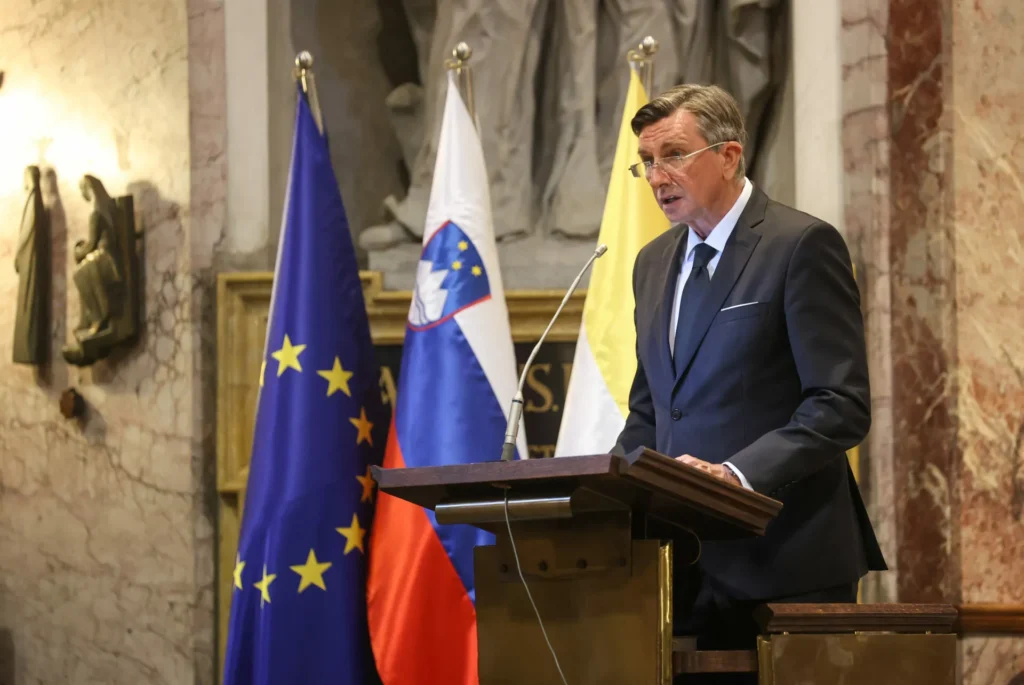“The government of Robert Golob should correct the unacceptable political and ethical mistake it made by abolishing the Day of Remembrance for the Victims of the Communist Regime,” said former President of the Republic Borut Pahor on the occasion of the Day of Remembrance for the Victims of All Totalitarian and Authoritarian Regimes. Meanwhile, at the unveiling of the memorial plaque in Strnišče, the President of the largest opposition party – the Slovenian Democratic Party (Slovenska demokratska stranka – SDS), Janez Janša, said that the memory of people’s suffering cannot be “killed”.
Several events were held across the country to mark the Day of Remembrance of the Victims of All Totalitarian and Authoritarian Regimes.
A break with Christianity can lead us to totalitarianism
Bishop Anton Jamnik pointed out at the Ljubljana Cathedral of Saint Nicholas that the success of the European Union and democracy in Slovenia depends not only on economic integration and scientific and technological progress, but also on the acceptance of a set of fundamental rights and values. These include human rights, freedoms, non-discrimination, the common good, justice, equality and religious freedom. “Democracy without values can easily turn into totalitarianism or authoritarianism,” Jamnik pointed out in his address.
He also stressed the importance of forgiveness on the occasion of the Day of Remembrance of the Victims of All Totalitarian and Authoritarian Regimes. “We must forgive, but we must never forget! And this is the decisive point of forgiveness: it is not about forgetting, but about liberation from inner anger, resentment and the desire for revenge. This corrodes every fibre of the human being, and the person who does not forgive is still living in the convulsion of victimhood; is still a slave of the one who has wronged them,” Jamnik noted.
The Church, he said, values the democratic system because the latter ensures that citizens hold those in power accountable for protecting, defending and implementing the values without which genuine democracy would be weakened. “The values on which democracy is based have Christian roots,” he stressed.
Former President Pahor: the Golob government should correct an unacceptable political and ethical mistake
The Mass was followed by a commemoration with a solemn address by the former President of the Republic, Borut Pahor. The former President recalled that since the first instance of the commemoration at hand, the memory of the victims of communist violence has also been commemorated. “But that is not the real message of this day. The real message of this day is the rejection of all totalitarianism and the call to nurture and strengthen democracy,” he stressed. He also called on the current government to correct “the unacceptable political and ethical mistake it has made by abolishing the Day of Remembrance for the Victims of the Communist Regime.”
A delegation from the Slovenian Democratic Party also attended the commemoration and wreath-laying ceremony at the Memorial to the Victims of All Wars in Congress Square.
In a press statement, the President of the New Slovenia party (Nova Slovenija – NSi), Matej Tonin, who laid a wreath at the monument to the victims of all wars in Ljubljana’s Congress Square at noon on Friday, also stressed that the country still owes a historical debt to the victims of communism. He recalled all those who were dug up in the abyss below Macesnova Gorica, 3450 of whom have still not gotten their right to a decent burial. “I think that Slovenia is such a civilised country that, at this time, they certainly deserve it,” Tonin said.
Janša: The truth about suffering cannot be killed
The leader of the opposition, Janez Janša, attended the unveiling of a memorial plaque commemorating the victims of inter-war Nazi and post-war communist violence at the Strnišče concentration camp. At the commemoration, he said, “The truth, when it comes to such great things, when it comes to such great suffering, simply cannot be killed. It is simply not possible to cover up, it is not possible to kill such great suffering as is being remembered here, and the memory must be preserved from oblivion.”
A delegation from the Study Centre for National Reconciliation (Študijski center za narodno spravo), the Military Vicariate of the Slovenian Armed Forces, and the Archdiocese of Ljubljana also laid wreaths at the Memorial to the Victims of All Wars and at the American Embassy in Ljubljana.
Memorial plaques to all victims of inter-war Nazi and post-war communist violence were unveiled at the former Kidričevo camp. The memorial plaque was blessed by Alojzij Cvikl, Archbishop of Maribor, and the theologian Ivan Štuhec gave the keynote speech.
The European Day of Remembrance for the Victims of All Totalitarian and Authoritarian Regimes, which has been commemorated in Slovenia since 2012, was first established in 2009 by the European Parliament in a resolution on European Conscience and Totalitarianism. The day for the commemoration was chosen because on this day in 1939, the Nazi Germany and the Communist Soviet Union concluded the Molotov-Ribbentrop Pact, followed by the outbreak of the Second World War.
C. Š.


